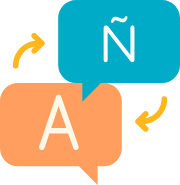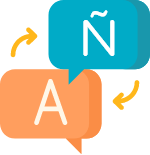Result for Latin@s
Create greater access Helping individual survivors with LEP access community services Despite Title VI’s enactment decades ago, advocacy is still required in many communities for services to be fully accessible to survivors with LEP. As new immigrant communities continue to move to the US and into more parts of the country, […]
Language access plan template This Language access template is designed to help your program create or enhance your language access plan. The template includes sample language that is relevant for working with survivors with limited English proficiency. The template is offered as a PDF document that is editable with Adobe Acrobat, […]
Direct advocacy tools Language identification cards and posters Minnesota Department of Human Services: This is a fairly comprehensive list of resources for Limited English Proficient individuals, including language interpreter cards, interpreter posters and other tools. City of Philadelphia: language access cards in 11 languages for access to services in the City […]
Community language assessment Which languages are spoken in our community? Identify the most commonly spoken languages in the area that you serve in order to help define your plan to meet those language needs. One comprehensive and easy to use resource is the mapping tool from The Civil Rights Division that […]
Management tools Building greater capacity to provide language access is an ongoing process. These tools can help you develop strategies to integrate language access into the daily operations of your program. Points of contact worksheet This Points of contact worksheet is pdf document that you can utilize as a tool for […]
Translated written material It is important that vital documents are translated into the languages commonly spoken throughout your community. Translated materials already exist on many websites and can be downloaded and used in your area (some may require the addition of local service information). For example, this site contains a large […]
Bicultural and bilingual staff A staff that reflects the languages and cultures in your community is best positioned to provide all survivors with meaningful access to your advocacy services. Bilingual advocates can speak directly and unambiguously to survivors, determine if they are safe, inform them of services available, and assess whether […]
Identifying spoken language Languages that you have never heard before might be hard to identify—an important first step in finding an interpreter! There are a few strategies to try. Language identification cards & posters If you are working in person with a survivor who is unable to tell you the English […]
Strategies for language accessibility There are many ways to increase language accessibility. This section of the toolkit explores strategies to enhance how you provide access (interpretation and translation) to the languages spoken by survivors in your area. Note: interpretation and translation should not be used interchangeably. Interpretation involves conveying information orally […]
Resource building The federal guidance notes that a small program “where contact is infrequent, [or] where the total cost of providing language services is relatively high” may not have the same obligations to meaningful access as do larger, better-resourced programs. However, because sexual and domestic violence programs provide services considered “crucial […]









